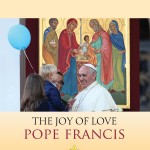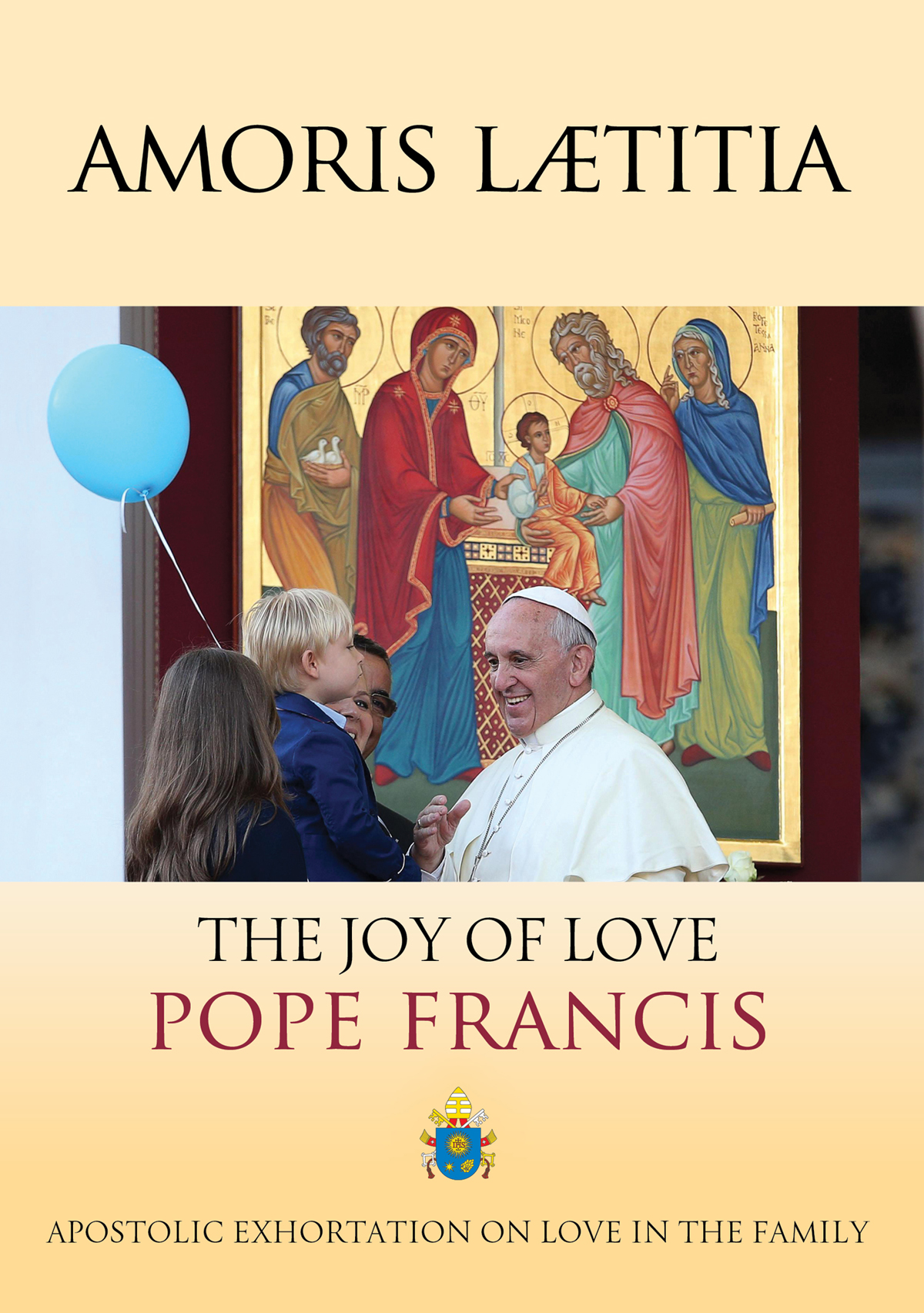 Faithful + Honest + Realistic + Creative
Faithful + Honest + Realistic + Creative
In this post-synodal apostolic exhortation, Pope Francis restates official teachings on marriage and family life, reflects on the underlying values of these teachings and why these commitments continue to matter in our world today, and honestly acknowledges that a great many people are unable to live fully the ideals proposed by the church. To them, he offers words of encouragement and hope, instructing them to do their best in their unique circumstances and to commit to further growth in understanding what love is and what love requires.
Pope Francis begins Amoris Laetitia by reminding readers that the church is always in process and our knowledge remains partial until “the Spirit guides us towards the entire truth” (3). Pastors and theologians will help the people of God find clarity in complex moral matters if they hold together four essential tasks: fidelity, honesty, realism, and creativity (2). But there is great tension between these tasks. Fidelity to the church requires openness to being formed by the wisdom of the tradition. But honesty might also require looking at that received tradition with a critical lens (even, as feminist theologians argue, a ‘hermeneutics of suspicion.’). To be realistic means that we work with what we’ve got. We appreciate people’s limitations. We understand that the gospel must be lived in our ordinary and messy lives and that we are imperfect people. But to be creative means that we seek to be life-affirming, willing to risk a new perspective that offers a liberating alternative to perceived obstacles. Faithful + Honest + Realistic + Creative. This is a radical departure from a deductive, authoritarian model of “instructing” the laity. Instead, it invites thoughtful analysis of particular challenges, and encourages us to live out gospel values in the real world. Towards the end of the document, the pope returns to something he wrote in Evangelii Gaudium:
“Jesus expects us to stop looking for those personal or communal niches which shelter us from the maelstrom of human misfortune, and instead to enter into the reality of other people’s lives and to know the power of tenderness. Whenever we do so, our lives become wonderfully complicated.” (308)
Wonderfully complicated. It is a beautiful phrase: light and hope together with pragmatism and complexity. Christians are called to model their lives after Jesus, the one who showed mercy and tenderness. How? It’s wonderfully complicated.
I’m going to highlight three related themes that I find particularly noteworthy in Amoris Laetitia: the shift from legalism to personalism, the shift from deductive logic to a process model of discernment, and a shift from a “one size fits all” mentality to a “growth ethic.” Taken together, I believe we see the foundations for ongoing development of Catholic teachings on marriage and the family, the implications of which are still unfolding. My overall take-away is that Pope Francis is saying it is time for lay people to discern their deepest values and take responsibility for living them out; we need to see church teaching for what it is—a complicated messy (even imperfect) tradition trying to form people to make healthy choices that are good for society. So this document becomes a celebration of conscience and a rejection of a legalistic paradigm.
From Legalism to Personalism
Repeatedly in the exhortation, the pope highlights the flaws of a rigid, legalistic paradigm. Instead, sometimes explicitly and sometimes with subtlety, he affirms a shift towards a personalist framework. A personalist framework focuses on the moral subject in his or her particularity instead of beginning moral reflection with attention to abstract norms. (See Charles Curran, “Chapter 4: Person” in The Catholic Moral Tradition Today: A Synthesis). Pope Francis reminds us that healthy family relationships are not based on strict rules that we blindly follow, but rather intimate relationships of love rooted in mutual care, interdependence, and tenderness.
Pope Francis tells readers that it is not enough for church leaders to stress “doctrinal, bioethical, and moral issues.” While this document does not challenge or undermine those received teachings (see the restatement of the central norms of Humanae Vitae at nos. 80-81 for example), the pope repeatedly reminds us to attend to the “complexity of various situations” (79). I interpreted this as a subtle shift akin to what Richard Gula described in Reason Informed by Faith as a move from a “classicist” to a “historically conscious” methodology, or what Todd Salzman and Michael Lawler (drawing on Janssens) describe as Vatican II’s shift to a theological anthropology that attends to the “human person adequately considered” (The Sexual Person: Towards a Renewed Catholic Anthropology). And when we pay attention to each person, we see that “everyone has something to contribute, because they have their life experiences, they look at things from a different standpoint and they have their own concerns, abilities, and insights.” (138). Furthermore, we are instructed to serenely contemplate “the ultimate fulfillment of each human person.” (166). “The deepest expectations of the human person” are stated via values and virtues not fixed essences: “a response to each one’s dignity and fulfillment in reciprocity, communion and fruitfulness.” (201). Stated crudely, a physicalist understanding of the natural law would focus on how in “God’s design” the male sexual organ fits in the female sexual organs; by contrast, a personalist framework wonders at and takes joy in the relationship between this woman [Sally], and this man [Pedro], marvels at the uniqueness of their friendship-love, and asks how the church can support them as they grow into ever more mature conjugal union. At the end of the day, we’re still talking about “God’s design for love,” but our framework has shifted to a personalist dimension that recognizes the uniqueness of each couple’s situation.
Thus the recipe for conjugal love is not exclusively restated in a canon law framework (for example, using language of contract, validity, indissolubility, procreation); instead one gets the impression that Pope Francis cares about the quality of people’s intimate relationships. His use of the natural law focuses not on fixed essences but on the “natural inclinations of the human person” to love (123, 131,143). And he explains that “marriage was not instituted solely for the procreation of children” but also that mutual love might grow and mature. (125). “The acts proper to the sexual union of husband and wife correspond to the nature of sexuality as willed by God when they take place “in a manner which is truly human.” (154).
It is remarkable, then, how Pope Francis honors the good qualities of those ‘irregular’ unions that nevertheless approach the goodness of God’s intent, seeing how couples might not be able to fully live church teaching even though their relationships contain “deep affection, responsibility towards the children and the ability to overcome trials” (78). Later he says that some unions realize the ideal in a “partial and analogous way” (292). In other words, he is celebrating the good within those relationships without saying that they must all conform to a model of perfection.
I certainly understand why some readers believe the document does not go far enough, given that there is still an implied hierarchy of ‘normative’ over ‘irregular’ unions. But I think it is still valuable to point out how Francis is downplaying a legalistic paradigm in favor of a personalist one. Revisionist theologians have explained the liberating implications of such a move for Catholic sexual ethics. While official teachings remain unchanged with regard to marriage, the Synod’s efforts to listen to the struggles of the faithful have made a difference in the tone of this document.
From Deductive Logic to Discernment of Spirits
A second shift I recognized in the document has to do with the pope’s rejection of an approach to moral theology based exclusively on deductive reasoning. Pope Francis writes:
“It is reductive simply to consider whether or not an individual’s actions correspond to a general law or rule, because that is not enough to discern and ensure full fidelity to God in the concrete life of a human being.” (304).
Here he is saying that discipleship is not about following rules but rather about an intimate relationship with God and living out the gospel. Then the pope cites Aquinas, explaining that the further one descends into particulars, the messier it gets. This is a famous passage often quoted in discussion of the natural law, especially after the publication of Humanae Vitae in 1968. The pope reminds us that general principles (e.g. ‘responsible parenthood’) are essential to communicate. But the application of that general principle in a particular couple’s life is not as straightforward as some might think. It requires discernment, not deductive logic.
The pope laments that church leaders “find it hard to make room for the consciences of the faithful,” who are “capable of carrying out their own discernment in complex circumstances.” (37). He repeatedly admonishes pastors who fail to understand that couples must discern for themselves how God is calling them to live out their faith.
“For this reason, a pastor cannot feel that it is enough simply to apply moral laws to those living in ‘irregular’ situations, as if they were stone to throw at people’s lives…. Discernment must help to find possible ways of responding to God and growing in the midst of limits.” (305).
The pope explains that decisions involving responsible parenthood require a couple’s mutual and ongoing discernment in which they must “thoughtfully take into account both their own welfare and that of their children, those already born and those which the future may bring.” (222)
“Discernment must help to find possible ways of responding to God and growing in the midst of limits. By thinking that everything is black and white, we sometimes close off the way of grace and growth, and discourage paths of sanctification which give glory to God.” (305) The pope reminds us that the moral life is not black and white, but also that human freedom must be exercised with thoughtfulness. So for example it is not enough for a pastor to sit in front of a room of couples preparing for marriage and tell them not to use birth control. The moral life is not about conforming to particular rules. Instead, as I wrote in chapter 7 of my book, couples should be invited to discern how God is calling them in their own particular circumstances. (For a great book on conscience and discernment I highly recommend Kathryn Cox’s Water Shaping Stone). We should be cultivating the freedom of lay people, not speaking about the moral life as if it requires blind obedience to authority.
From “One Size Fits All” to a “Growth Ethic”
The final theme I wish to raise up has to do with the “law of gradualness” in the apostolic exhortation. The pope admits that the moral life is complex and there is no “one size fits all” answer to marriage and family questions today.
“If we consider the immense variety of concrete situations such as those I have mentioned, it is understandable that neither the Synod nor this Exhortation could be expected to provide a new set of general rules, canonical in nature and applicable to all cases. What is possible is simply a renewed encouragement to undertake a responsible personal and pastoral discernment of particular cases, one which would recognize that, since ‘the degree of responsibility is not equal in all cases,’ the consequences or effects of a rule need not necessarily always be the same.” (300).
Whether discussing the formation of children, sexual education, marriage preparation, or the just response to divorced couples, the pope emphasizes the need to encourage the person to do his or her best, while simultaneously recognizing that people have different capacities. We should always be striving to do our best and we are always works in progress. The moral life is dynamic. But we should strive towards moral maturity. The pope is encouraging adult readers to have a grown up faith. And he is encouraging pastors to stop judging people according to an ideal of perfection and instead offer words of assistance. Consider these three passages:
“Were maturity merely the development of something already present in our genetic code, not much would have to be done. But prudence, good judgment and common sense are dependent not on purely quantitative growth factors, but rather on a whole series of things that come together deep within each person, or better, at the very core of our freedom.” (262)
“Along these lines, Saint John Paul II proposed the so-called “law of gradualness” in the knowledge that the human being “knows, loves, and accomplishes moral good by different stages of growth.”… Each human being “advances gradually with the progressive integration of the gifts of God and the demands of God’s definitive and absolute love in his or her entire personal and social life.” (295).
“No family drops down from heaven perfectly formed; families need constantly to grow and mature in the ability to love. This is a never-ending vocation born of the full communion of the Trinity, the profound unity between Christ and his Church, the loving community which is the Holy Family of Nazareth, and the pure fraternity existing among the saints of heaven. Our contemplation of the fulfillment which we have yet to attain also allows us to see in proper perspective the historical journey which we make as families, and in this way to stop demanding of our interpersonal relationships a perfection, a purity of intentions and a consistency which we will only encounter in the Kingdom to come. It also keeps us from judging harshly those who live in situations of frailty. All of us are called to keep striving towards something greater than ourselves and our families, and every family must feel this constant impulse.” (325)
The overarching message here is one of patience and encouragement. Simply restating ideals is not helpful. Rather, communicating a message of inclusion, compassion, and mercy ensures that people first understand God’s love for them and then invites them to see how they respond to that love in their real and concrete lives, “with all their daily troubles and struggles, joys and hopes” (315).
It’s wonderfully complicated.





Trackbacks/Pingbacks